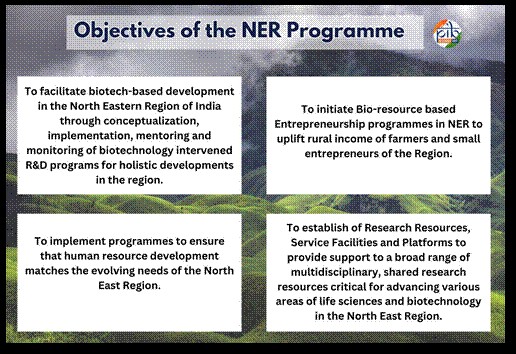Biotechnology and Bioeconomy in North East India

- 25 Feb 2025
In News:
The North Eastern Region (NER) of India, endowed with rich biodiversity, cultural heritage, and indigenous knowledge, is undergoing a transformation through biotechnology-led initiatives. The Department of Biotechnology (DBT) under the Ministry of Science and Technology is spearheading this change to harness the region’s biological resources for inclusive and sustainable development.
Biotechnology: Definition and Types
Biotechnology involves the use of biological systems or organisms to develop products and technologies that improve healthcare, agriculture, industry, and the environment.
Types of Biotechnology:
- Medical Biotechnology – Vaccines, gene therapy, diagnostics.
- Agricultural Biotechnology – Pest-resistant crops, high-yield seeds, and sustainable agriculture.
- Industrial Biotechnology – Biofuels, biodegradable plastics, enzyme-based processes.
- Environmental Biotechnology – Waste treatment, pollution control, and bioremediation.
Why North East India is Ideal for Biotech Development
- Biodiversity Hotspot: Home to 8,000+ plant species, including 850+ medicinal plants and agro-climatic diversity.
- Indigenous Knowledge: Rich traditional practices in herbal medicine and organic farming.
- Agri-Biotech Potential: Ideal for medicinal crops, essential oils, and organic produce.
- Industrial Opportunity: Scope for biofuel production, value-added food processing, and pharmaceutical industries.
Key DBT Programmes and Initiatives in the North East
- DBT North Eastern Programme
- Since 2010, 10% of DBT’s annual budget is dedicated to NER.
- Focus: R&D, education, infrastructure, entrepreneurship, and employment generation in biotechnology.
- Twinning R&D Programme (2010–11)
- Promotes collaborative biotech research between NER and national institutes.
- Over 65 institutional partnerships, supporting 650+ projects and benefiting ~2,500 researchers/students.
- Biotech Hubs Network (Since 2011)
- 126 Biotech Hubs established across universities and colleges.
- Phase II supports 54 hubs for focused research on local issues.
- BLiSS (Biotech Labs in Senior Secondary Schools): Started in 2014 to introduce biotechnology at the school level.
- Visiting Research Professorship (VRP) Programme:Launched in 2015 to utilize the expertise of top scientists for NER biotechnology development.
- Chemical Ecology Programme (2015): Collaborative training by NCBS, UAS, and IISc for Ph.D. scholars in the field of chemical ecology.
- Genomics Training Programme (2016):Conducted by DBT-NIBMG, Kalyani, for biomedical researchers in the region.
Agri-Biotech and Livelihood-Oriented Initiatives
- DBT-NECAB (Phase III): Enhancing biotech applications in agriculture.
- Citrus Research: Disease-free scion material of Khasi mandarin and sweet orange developed at IHT, Assam.
- Medicinal Crop Cultivation: 64.1 acres under Curcuma caesia and lemongrass cultivation; 649 farmers trained.
- Essential Oil Distillation: Facility set up in Mudoi village, Arunachal Pradesh, for revenue support.
- Value-Addition in Wild Fruits: Docynia indica (Assam apple) processed into products like jam, pickles, and candy.
Technology-Driven Achievements
- Bacterial Blight-Resistant Rice (Patkai): Developed by Assam Agricultural University; notified by CVRC.
- Brucellosis Detection Kit: Lateral Flow Assay (LFA) to detect anti-Brucella antibodies in livestock.
- Pig Disease Diagnosis Expert System (PDDES): Mobile app for livestock disease detection and management (available on Google Play Store).
Challenges in NER’s Biotech Growth
- Limited infrastructure for biotech R&D and production.
- High cost of commercial biotech projects.
- Shortage of trained professionals in advanced biotech fields.
- Vulnerability to climate change and poor connectivity with markets.
Way Forward
- Strengthen Infrastructure: Develop biotech parks, R&D centers, and incubators.
- Skill Development: Train local youth, researchers, and farmers.
- Public-Private Partnerships: Foster industrial collaboration for startups and innovation.
- Eco-friendly Technologies: Promote sustainable and low-impact biotech industries.
- Digital Integration: Use AI and data analytics for agricultural and healthcare biotech solutions.
